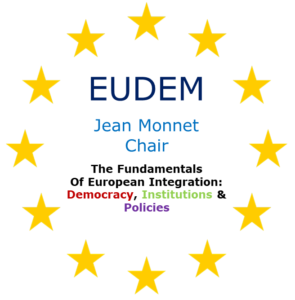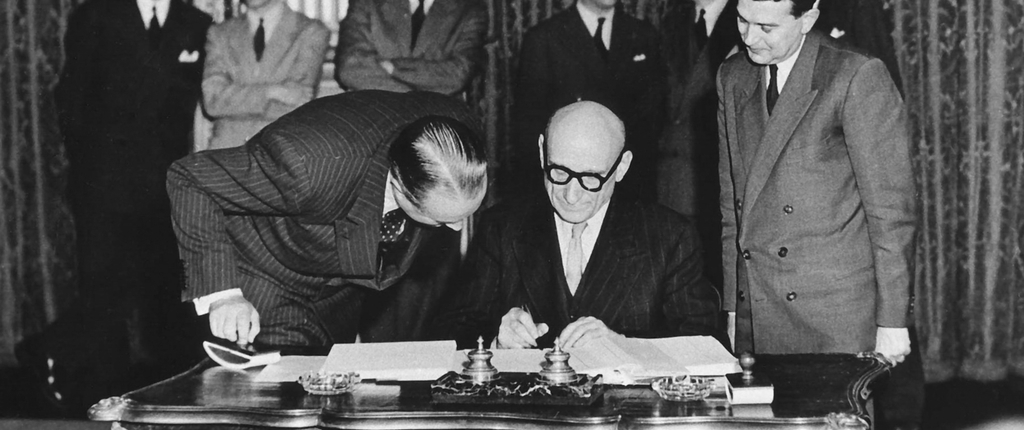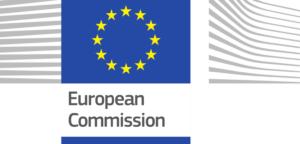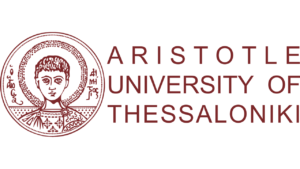The course, offered in Greek for Political Sciences undegraduate students of the 2nd year (spring semester) introduces students to the study of European integration from a historical and theoretical perspective. It examines the evolution of the European project and the ideas on the unification of the continent that were developed in the past. It then analyses the formative years of the ΕC/EU process after the 2nd World War and examines the developments of European integration up until the present.
In addition, the course analyzes the process of European integration both through the prism of the theories of regional integration and with regard the specific steps and actions taken by the Union.
Finally, the course introduces students to the European institutions and their evolution within the European political system.
The course is open to students of other faculties and departments and is provided as an open course (category A+) to the general public.
Lectures last 3 hours apr. and ar fully supported with Power Point Presentations and other audiovisual support, such as significant historical speeches, events and relevant documentation.

The course structure is as follows:
- The projects on regional integration before the 20th century (from Kant to Kallergi).
- The inter-war plans for cooperation between European people.
- European federalism in the resistance movements. The Manifesto of Ventotene.
- Factors that contributed to the post-war integration.
- European cooperation projects after World War II. The O.E.C.E.
- The birth of federal movements
- The Congress of The Hague and the establishment of the Council of Europe.
- The creation of the European Coal and Steel Community.
- The innovative character of supranational integration.
- Efforts to set up a European federal system.
- The European Defence Community and the European Political Community.
- The birth of the EEC
- The objectives and institutional framework of the EEC.
- The consolidation of the Community in the 1960s.
- The conflict between supranational and intergovernmental approaches and the Luxembourg compromise.
- The EEC during the 1970s.
- The Werner plan and its failure.
- The first enlargement.
- Monetary cooperation and the European Monetary System.
- The first movements towards foreign policy coordination.
- The institutional and political developments of the 1980s.
-
- The Draft Treaty of 1984.
- The Single European Act and the establishment he Single Market.
-
- Europe after the fall of the Berlin Wall.
- The Treaty of Maastricht and the creation of the European Union. Institutional characteristics and policies.
- Economic and Monetary Union. Its impact and consequences.
- The deepening and the «communitarization» of the EU in the 1990s.
- The Treaties of Amsterdam and Nice.
- The enlargement towards Eastern Europe.
- The efforts towards the «constitutionalisation» of the EU.
- The Constitutional Treaty and the Lisbon Treaty.
- The EU in crisis.
- Brexit
- The eurozone crisis
- The refugee crisis
- The main theories of regional integration.
- Federalism.
- Intergovernmentalism.
- Functionalism and neo-functionalism.
- Contemporary theories of regional integration.
- Liberal intergovernmentalism.
- The concept of multilevel governance.
- The projects on regional integration before the 20th century (from Kant to Kallergi).
Learning Outcomes
The course allows students to acquire full knowledge of the history of European integration, learn the basic features of the various stages of EU integration after WW II and be able to analyze sufficiently the political developments of the EU (both in the past and current). Students can thus be able to understand the current political reality of the EU based on their understanding of the past.
In addition, a good knowledge of the process of EU integration will be of assistance to students in their further studies not only on EU-related studies but also on other areas of international relations.





